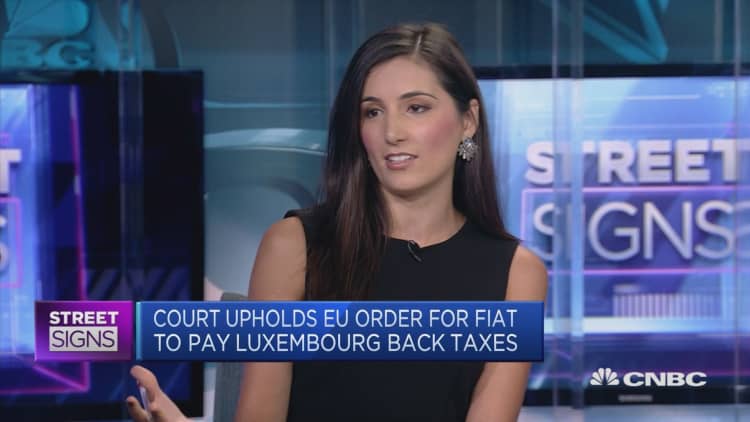Fiat will have to repay up to 30 million euros back in taxes, Europe's second highest court ruled Tuesday.
In a separate case, the European general court decided that Starbucks did not have to repay a similar amount in taxes.
This comes after the European Commission, the EU's executive arm, said in 2015 that both companies had received illegal tax benefits, provided by Luxembourg and the Netherlands.
Fiat told CNBC via email that it was "disappointed with the General Court's judgment and is considering the next steps to take in this matter."
"The matter is not material to the Group," the spokesperson for Fiat Chrysler Finance Europe, also said.
Starbucks told CNBC via email: "Starbucks welcomes the decision by the European Court that makes clear Starbucks did not receive any special tax treatment from the Netherlands. Starbucks pays all of its taxes wherever they are due."
What were the complaints?
The European Commission concluded four years ago that Luxembourg and the Netherlands granted selective tax advantages to Fiat and Starbucks, respectively. The tax arrangements were described by the Commission as "artificial and complex" and meant that both firms paid lower tax rates.
European Commissioner for Competition Margrethe Vestager said in 2015 that Fiat's Luxembourg unit paid "not even" 0.4 million euros ($0.44 million) in corporate tax in 2014 and Starbucks' Dutch subsidiary paid less than 0.6 million euros. As a result, the European Commission ordered both countries to recoup between 20 and 30 million euros ($22 - $32 million) from each company.

However, the European second highest court decided differently on both cases. "The General Court confirms the Commission's decision on the aid measure granted by Luxembourg to Fiat Chrysler Finance Europe," the court said in a press release Tuesday.
Regarding the case involving Starbucks, the General Court said it "rejects the claim that the Commission erred in identifying an arm's length principle as a criterion for assessing the existence of State aid."
Reacting to Tuesday's court decision, Vestager said in a statement: "Today's judgments give important guidance on the application of EU State aid rules in the area of taxation. At the same time, each case has its specificities and involves complex legal questions. We will study the judgments carefully before deciding on possible next steps."
How did Fiat and Starbucks react?
Fiat and Starbucks were against the Commission's decision and challenged it in court. Both companies, through separate cases, asked for the annulment of the Commission's decision, arguing that the Brussels-based institution was wrong.
Starbucks argued in the court case that the Commission committed a "material error of law and a manifest error of assessment when interpreting and applying the reference framework." It also said that Brussels wrongly quantified the alleged tax aid.
Fiat said the commission "misapplied" the competition rules.
What next?
Tuesday's ruling comes at an important time for Vestager, who's been described by President Trump as Europe's "tax lady." She is due to start her second mandate in Brussels in November and Tuesday's decision could open the door to further investigations in illegal tax practices.
Vestager said in a statement that "the Commission will continue to look at aggressive tax planning measures under EU State aid rules to assess if they result in illegal State aid."


